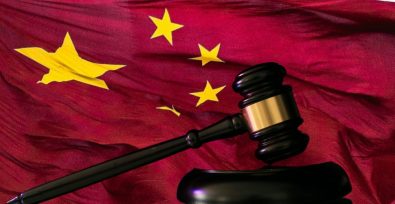To silence critics and suppress evidence of Uyghur forced labor, China is weaponizing defamation lawsuits to silence critics, according to a recent article in the New York Times. This tactic, often called “lawfare,” aims to intimidate researchers, think tanks, and advocates and could have a chilling effect.
Be silent and back down or face the costs
Sheffield Hallam University is a well-known and respected public research University. And their findings in the field of modern slavery are regularly cited by organizations around the world. Just over a year ago they published a report documenting a Chinese clothing company’s potential tie to forced labor.
Then in November, members of the British Parliament pointed to the report as evidence of China engaging in “slavery and forced labor from another era.” That’s when the researchers got slapped with a defamation lawsuit. And they are not alone. Australian and U.S. think tanks have also been threatened with lawsuits.
Danielle Cave, a director at the Australian Strategic Policy Institute (ASPI), which published the ground-breaking ‘Uyghurs for Sale‘ research in 2020, said:
“It’s mountains of legal letters, hassling, going around saying ‘We’re going to sue’, it’s quite stressful and it is designed to distract you.”
Speaking about similar type lawsuits filed by China in the U.S., Rep. John Moolenarr said:
“(Researchers) are faced with a choice: Be silent and back down against the CCP’s pressure campaign or continue to tell the truth and face the tremendous reputational and financial costs of these lawsuits alone.”
A real-world example from Australia underscores the two fronts these lawsuits can harm on. In 2020 the Australian government received a list of 14 complaints China wanted resolved to improve relations between the two nations. Significantly, on that list was the government’s funding of ASPI. And due to Chinese-related legal matters ASPI’s legal costs had already gone from zero in 2018 to over $200,000. By applying pressure at a diplomatic and financial level, China aims to silence dissenting voices.
This is what “lawfare” looks like
After Eric Sayers wrote an opinion article critical of Chinese-made drones, the U.S. based think-tank he worked for was threatened with a lawsuit if it wasn’t removed. Sayers wrote on social media that this was what Chinese government “lawfare inside our democracy looks like.”
Anna Puglisi, a researcher at Georgetown University also targeted by China said while testifying before the House committee:
“Speaking out today might put me in further jeopardy, but I feel that if we begin to self-censor ourselves because of the actions of an authoritarian regime, we become more like them and less like an open democracy.”
It’s no coincidence that the targets of these lawsuits are often those uncovering the exploitation of Uyghurs. Thankfully, the “lawfare” in most cases hasn’t stopped the work. And while ASPI remains a target due to research into topics like forced labor, they continue to receive government funding.
Freedom United’s campaign to end Uyghur forced labor calls on governments and corporations to take a stand against these abuses. With China’s weaponization of lawsuits that threaten transparency and accountability, it is crucial that we stand strong in our fight to end Uyghur forced labor. Stand with us by signing our petition.







Freedom United is interested in hearing from our community and welcomes relevant, informed comments, advice, and insights that advance the conversation around our campaigns and advocacy. We value inclusivity and respect within our community. To be approved, your comments should be civil.